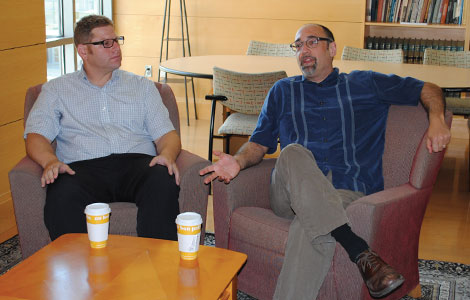From the moment we rise each day, we are surrounded by messages from the media: news, advertising, images, sounds, video, texts. How do we make sense of it all intellectually? Students in UMBC’s Media & Communication Studies (MCS) major are trying to do just that. UMBC Magazine sat down with Jason Loviglio, director of the program, and Donald Snyder, a lecturer and director of the MCS internship program, to find out more about one of UMBC’s fastest growing majors.
* * * * *
UMBC Magazine: People might be surprised that many of the major’s introductory classes are grounded in theory, rather than producing media.
Jason Loviglio: Any humanities discipline should have as its goal to help young minds think critically, to peel away layers of distracting information, misleading information, and misinformation to get at implicit truths and implicit facts that are harder to see. All of us on the MCS faculty see ourselves as engaged in the difficult task of encouraging students to think critically, to look for implicit meanings, and to read against the grain whenever possible.
Donald Snyder: We’ve also tried to balance the theoretical core with practical applications of media literacy in the world of today or the world of tomorrow. Students have responded overwhelmingly positively to the push toward internships. We talk to them about the importance of getting really good practical experience and figuring out what it means to be a professional. Our lab-based courses and our new course in media literacy will focus on digital and public projects. It’s very exciting with the technologies we have available to us in terms of production and distribution.
UMBC Magazine: Why is UMBC such a good place for a media and communication studies program?
Loviglio: The fact that the program exists has everything to do with the culture of collaboration at UMBC. There was an interest at the highest levels of the university to create something along these lines. It was entrusted to humanities people and we made it after our own interests: we made it rigorous, we made it critical, we made it writing intensive, and we made it interesting to us.
We also had support from our dean, John Jeffries, and from three provosts. And the most important thing is that we had massive support from other humanities departments and programs, who volunteered time and resources to build the capacity to run a major that is now one of the middle- to large-sized majors in the college. In some cases, they lost students to us. That spirit of collaboration and cross-disciplinary cooperation is a credit to an atmosphere at UMBC that has been encouraged from top-down, but that was really built from bottom-up.
Snyder: With the growth that we’ve experienced, there was certainly a demand for this type of intellectual field at UMBC.
UMBC Magazine: The job market in traditional media is shrinking. What value does an MCS degree offer?
Loviglio: The first thing we’re eager to tell students is what we’re not. We’re not a narrow pre-professional major and we’re not preparing students for specific technical positions within the media industries as they exist right now. What we’re trying to do is much more like what a classical liberal arts discipline has always tried to do, which is teach the skills of communication, critical thinking, and love of learning. The major offers skills that we think will serve students as workers and citizens in the 21st century better than anything else we can think of.
Snyder: Thinking about media in a broader way instead of just narrow media tracks is one of the reasons we built this interdisciplinary model. We’ve had students who have combined environmental science and MCS, communicating essential environmental issues to the public. We’ve had theatre students who have talked about bringing new social media platforms to that more traditional art form. The major certainly has been valuable for students to really establish themselves within all kinds of different fields.
— Stefanie Mavronis ’12
Tags: Fall 2012

